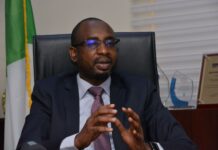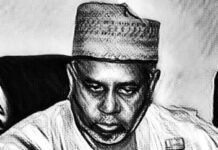
Oshiomhole vs Air Peace: Nigeria’s Skies of Delay and Impunity
By Zekeri Idakwo Laruba
The recent altercation involving Senator Adams Oshiomhole and Nigeria’s leading airline, Air Peace, over allegations of extortion and flight delays has ignited a nationwide conversation.
What initially appeared to be a simple case of passenger dissatisfaction has since spiraled into a public spat, exposing deeper and more troubling issues within Nigeria’s aviation sector — including favoritism, extortion, weak regulation, and institutional malpractice.
Senator Oshiomhole, a former governor and labour leader, accused Air Peace of unethical conduct after he was reportedly denied boarding a flight to Benin. In widely circulated videos, he alleged that the airline resold tickets and extorted passengers even after the check-in counter had closed.
Visibly agitated, he claimed to be speaking on behalf of stranded passengers who were allegedly left behind due to questionable airline practices. Air Peace, however, has firmly denied the accusations.
In a detailed statement, the airline described Oshiomhole’s claims as “deliberate falsehood,” stating that no tickets were sold after check-in had closed and that the flight in question departed with over 30 empty seats.
The airline alleged that Senator Oshiomhole arrived late, disrupted check-in operations, climbed onto a baggage conveyor belt, and incited other passengers. It urged the Federal Airports Authority of Nigeria (FAAN) to release CCTV footage from the airport to corroborate its account and provide clarity on the incident.
While public opinion remains divided over who was right or wrong, the incident has peeled back the curtain on broader, systemic flaws in Nigeria’s aviation landscape.
Many Nigerians are all too familiar with the frustrations of erratic flight schedules, unexplained delays, chaotic boarding processes, and the perception — often validated by experience — of unofficial “payments” and VIP privileges at the nation’s airports.
Though Air Peace insists no extortion took place in this case, the grievances raised resonate with countless stories from ordinary travelers. At the heart of the matter lies a chronic lack of regulatory enforcement.
The Nigerian Civil Aviation Authority (NCAA), the statutory body responsible for regulating airlines and safeguarding passenger rights, has remained conspicuously silent on the issue.
Yet, Nigerian law is unambiguous: under the Nigerian Civil Aviation Regulations and the Montreal Convention, passengers are entitled to compensation or care when flights are delayed, cancelled, or overbooked.
Airlines are required to provide refreshments after a one-hour delay and offer communication or re-routing options after two hours. In practice, however, very few airlines comply, and even fewer are ever penalized.
This absence of regulatory bite creates a vacuum where airlines operate at their discretion, and passengers are left without recourse. The culture of impunity, where VIPs demand special treatment and airport officials selectively enforce rules, only deepens the erosion of public trust in the system.
This controversy, therefore, goes beyond one senator and one airline. It underscores a systemic breakdown that calls for immediate and deliberate reform.
As a starting point, the Ministry of Aviation should commission an independent investigation into the events surrounding the incident. Nigerians deserve not just answers to Senator Oshiomhole’s allegations, but clarity on recurring concerns about check-in irregularities, overbooking, and alleged extortion.
Additionally, FAAN must release the CCTV footage from that day to establish an objective record of what transpired. Doing so would restore a measure of credibility and demonstrate a commitment to transparency and fairness.
At the same time, the NCAA must rise to its statutory responsibility. It should launch a nationwide public awareness campaign on passengers’ rights and establish a functional, 24-hour complaint and redress platform that is easily accessible to all.
Airlines must also be held accountable for persistent delays, poor service delivery, and violations of aviation laws. Where regulations prescribe compensation or refunds, they must be enforced without exception.
The era of silence and impunity must end. Ultimately, Nigeria’s aviation industry is in dire need of a cultural reset — one where rules are enforced, passengers’ rights are respected, and VIP influence does not override standard procedures.
Senator Oshiomhole may have missed a flight, but Nigeria stands to lose far more if the real issues exposed by this controversy are swept under the carpet. This must not become just another scandal that fades with the news cycle.
The rot in Nigeria’s aviation sector is real. And the time for reform is long overdue.
Zekeri Idakwo Laruba is the Assistant Editor PRNigeria and Economic. idakwozekeri93@gmail.com

































